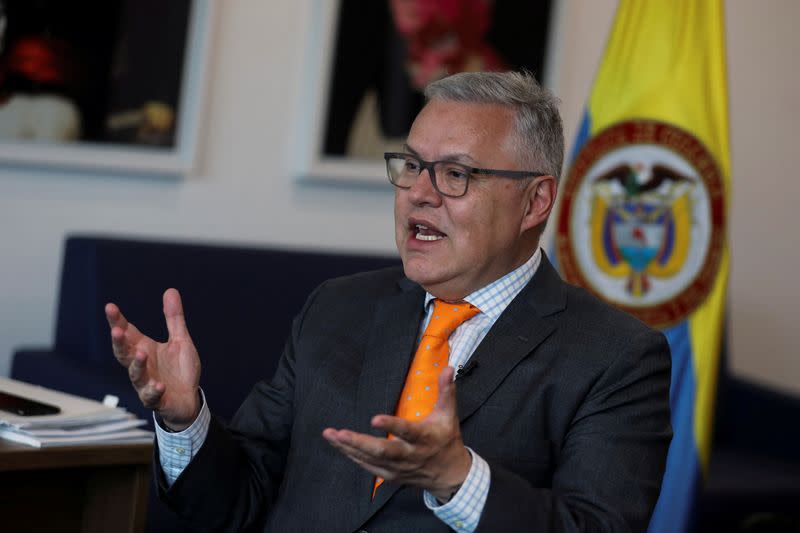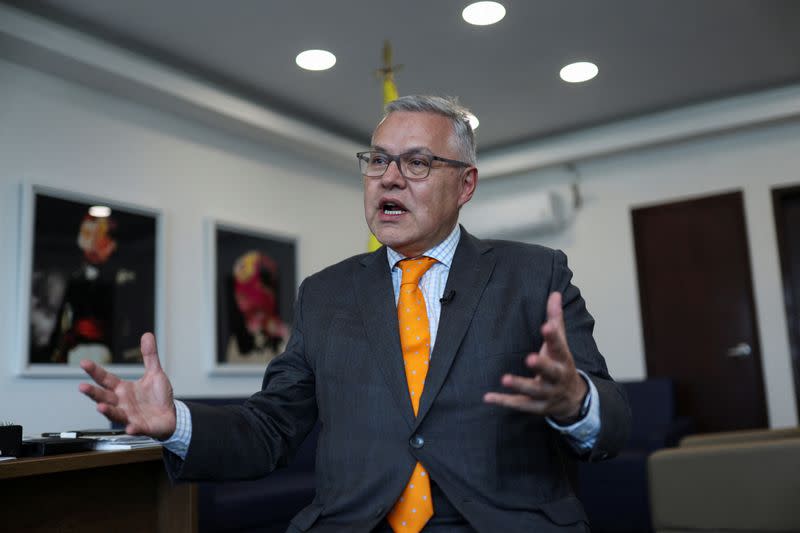Colombia surrender law would not pardon drug traffickers: minister
- Oops!Something went wrong.Please try again later.
By Luis Jaime Acosta
BOGOTA (Reuters) - Colombia will not pardon drug traffickers or release them from prison under surrender deals the government wants to make with criminal groups, but it will break up gangs, the justice minister said.
Minister Nestor Ivan Osuna is spearheading efforts by the government of leftist President Gustavo Petro to get lawmakers to approve a surrender process for criminal groups as part of Petro's pledge to bring "total peace" to Colombia.
Cocaine production and trafficking are considered the main driver of an almost six-decade armed conflict in Colombia that has left more than 450,000 dead and millions displaced.
The government currently enjoys a majority coalition in congress, but the surrender proposal has been heavily criticized by some politicians and Attorney General Francisco Barbosa, who warned of risks to negotiating with drug traffickers and potentially pardoning them.
"There are no pardons, there is no mass release (from prison). There is the offer of a voluntary dismantling of armed structures in exchange for a more benign penal treatment," Osuna told Reuters in a interview late on Tuesday. "This is a law that seeks to overcome a problem of violence."
Interested groups must commit to destroying their criminal networks, recognizing their crimes, giving victims reparations and turning over weapons, assets and information about their activities, he said.
The Gaitanista Self-Defense Forces, better known as the Clan del Golfo, and the Sierra Nevada crime gangs agreed to a bilateral ceasefire with the government at the start of the year.
The high peace commissioner has said other groups have expressed interest in the surrender process, which would dole out prison sentences of between six and eight years coupled with four years of victim restoration work.
The law would apply sentences of some 30 years to crime gang members who do not properly comply with the process.
Under the law, security services would verify the membership of criminal groups to prevent other drug traffickers from falsely claiming access to benefits, Osuna said.
Some recognized drug traffickers paid hefty sums to take over control of right-wing paramilitary squadrons included in a 2005 surrender deal, thus obtaining legal benefits.
The surrender process would occur in tandem with peace talks with the ELN rebels and negotiations with dissident groups founded by former members of the FARC rebels which the government has said will begin soon.
Many criminal leaders are wanted on U.S. drug trafficking charges. The decision about whether to extradite those who comply with the surrender deal will be up to Petro, Osuna said.
"If only we had not needed a law to reduce sentences in exchange for dismantling gangs," Osuna said. "But the situation has come to this point and the state offers the possibility ... so we can build a future without drug trafficking."
(Reporting by Luis Jaime Acosta; Writing by Julia Symmes Cobb; Editing by Nick Macfie)


